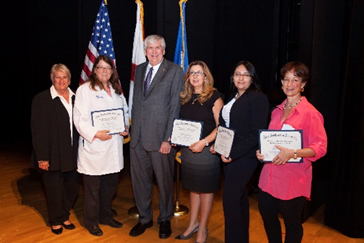Targeted Aerobic Rehabilitation in ME/CFS Using a Novel Metabolic Testing Model
Grant Winners
- Maria Vera-Nunez, M.D. – College of Osteopathic Medicine
- Irina Rozenfeld, M.S.N., ARNP – College of Osteopathic Medicine
- Violetta Renesca, M.S.N., ARNP – College of Pharmacy
- Jeffry Cournoyer, ATC – College of Osteopathic Medicine
- Nancy Klimas, M.D. – College of Osteopathic Medicine
Dean
- Elaine M. Wallace, D.O., M.S., M.S., M.S. – College of Medical Sciences
Abstract

Myalgic Encephalomyelitis/Chronic Fatigue Syndrome (ME/CFS) is a challenging chronic disease, characterized by persistent disabling fatigue, accompanied by post-exertional malaise, impaired memory and concentration, nonrestorative sleep, orthostatic intolerance, and musculoskeletal pain; negatively impacting the patient's ability to function, to study or work, with negative economic consequences to patients, their families and the society. The fatigue is not explained by other medical or psychiatric conditions, and the diagnosis is made only after other potential etiologies have been ruled out. Unfortunately, while there are a variety of diagnostic tests that can assist with the diagnosis, there is no definitive treatment for it.
The Institute of Medicine estimates that it affects up to 2.5 million Americans, and estimates that between 84 to 91% live with the condition unaware of the diagnosis. In 2015 the National Academy of Medicine (previously Institute of Medicine) highlighted the urgent need for research to discover causes and develop diagnostic markers and treatments.
Exercise is a major clinical intervention for healthy aging as well as to prevent or treat a myriad of diseases. However, when ME/CFS engage in exercise, it can provoke worsening of symptoms, leading to a vicious cycle of physical inactivity, depression, weight gain, metabolic diseases, and further uncontrolled ME/CFS. Contrarily, if properly guided, exercise could have positive effects in sleep, physical functioning and self-perceived general health. Nevertheless, exercise interventions for ME/CFS are not standardized, and further research is much needed to determine the type, duration and intensity of the most beneficial individualized exercise intervention.
Our team has previously utilized a maximal exercise challenge model to measure the post-stress effect on immune responses in patients with ME/CFS. We identified a compromised anti-inflammatory response to exercise, as well as a gender-specific response to exercise associated with sex hormones.
We propose to conduct a pilot study using a novel metabolic testing model, Indirect Calorimetry with a submaximal clinical exercise tolerance test, to quantify objectively how long a pilot group of ME/CFS female patients could sustain a low-level to moderate continuous intensity activity using their aerobic capacity (fat utilization) and how quickly they move from an aerobic to an anaerobic condition. We will use this test model to create a standardized, low-cost, 16-week rehabilitation intervention that will include aerobic and anaerobic exercise, to evaluate its tolerance and impact in the aerobic and functional capacity of these patients.